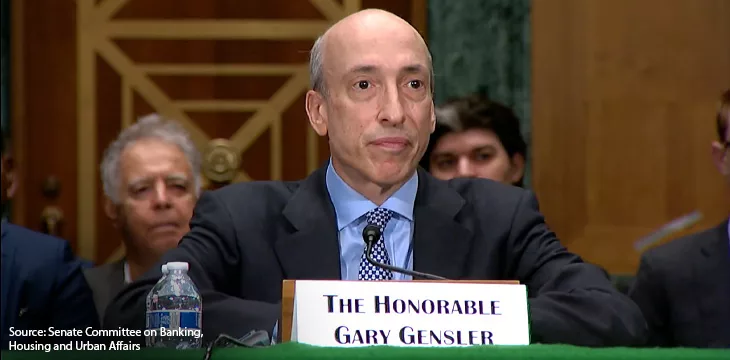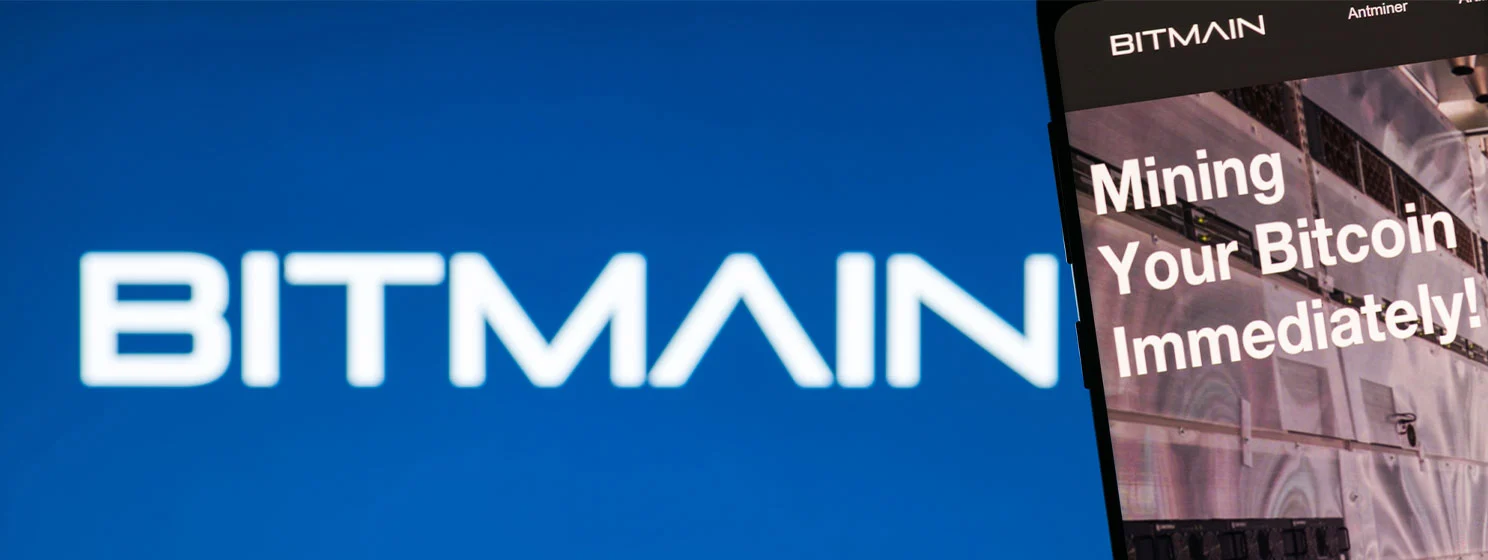|
Getting your Trinity Audio player ready...
|
U.S. Securities and Exchange Commission (SEC) Chair Gary Gensler appeared before the Senate Committee on Banking, Housing and Urban Affairs once again on September 12, as he was grilled on the SEC’s track record during his tenure and further highlighting contrasting attitudes toward the work of the securities regulator and its Chair.
Though it’s not the first time Gensler has given such testimony, recent events have placed the SEC’s decision-making under the microscope. Since Gensler last testified (before the House Financial Services Committee—also on SEC oversight), the agency has charged Coinbase (NASDAQ: COIN) and Kraken—the digital asset industry’s biggest exchanges—with illegally listing securities. In addition, several of its other enforcement actions against digital asset companies have come to a head in 2023. In July, a court ruled in SEC v Ripple that programmatic sales of XRP on exchanges did not amount to a security, while institutional sales did; that case continues. Shortly thereafter, the court overseeing the SEC’s case against Do Kwon and Terra Labs ruled that the Ripple decision might have been wrong and that exchange-based sales of digital assets could amount to securities offerings after all.
On top of that, a court just told the SEC to review its rejections of BTC spot ETPs on the basis that it had not sufficiently justified its reasoning. The new decisions are expected in October.
That’s the context in which Gensler faced down Senators’ questions on Tuesday.
In opening the hearing, however, Committee Chairman Senator Sherrod Brown (D-OH) gave the SEC something of a pre-emptive defense, focusing the conversation on investor protection:
“It’s been suggested that the SEC is moving too fast recently…. Too many rules, too fast, too hard to comply with. But America’s markets are the greatest in the world because we have strong investor protections and because we have effective regulators —at the SEC and elsewhere—who work to make sure we have transparent, fair and honest markets that Americans deserve.”
“We know all too well what happens when regulators at the behest of lobbyists and the politicians who always do their bidding ignore changes or are too slow to respond.”
Here, Brown refers to the Lehman collapse, which occurred 15 years ago today.
“You’ve been busy: there’s more work to do to protect American savers,” the Chair told Gensler.
Illustrative of the breadth of views and attitudes within the Committee, the next speaker, Senator Tim Scott (R-SC), was far more scathing. He cast the SEC and its leader as non-responsive and slow to engage with governmental inquiries, even as a series of crises—such as the FTX collapse and bank failures—sent the digital asset industry and others into meltdown.
“Sadly, your agency has fallen short on this obligation to be transparent and responsive to Congressional oversight. I have serious concerns with the way you are leading the SEC,” Scott said.
Top of mind for Scott was the effect that the SEC’s lack of engagement has had on the U.S.’s ability to compete as an innovator. Scott told Gensler that his goal as SEC Chair should be “to fuel competition and innovation in the marketplace and expand the ability for Americans from all walks of life… to access a wide spectrum of investment options for their hard earned dollars.”
“Without pro-growth regulations, we are preventing our kids and our kid’s kids from taking control of our financial futures,” Scott noted.
“Instead, your agency has churned out a seemingly endless assembly line of new and unneeded regulatory hurdles to capital formation and market access.”
After Scott’s allotted time, Gensler addressed the Committee directly for the first time on the day, albeit briefly. He introduced the SEC’s three-part mission: to protect investors, to facilitate capital formation, and to ensure orderly and efficient markets. The SEC is also, he says, the cop on the beat watching out for the Senators’ constituents.
Beyond that, the most substantive discussion on digital assets came during the questioning from Senator Cynthia Lummis (R-WY). In particular, she questions Gensler over issuing a SEC staff bulletin that would oblige companies to list digital assets as under their custody on balance sheets. Lummis expressed particular concern with recent digital asset bankruptcy cases in which customer assets were ruled to be subject to general creditor claims against the company. This happened in January in the case of Celsius Network, where a Judge ruled that millions in customer deposits formed part of Celsius’ assets and could be used to pay creditors.
Gensler highlighted that what was interesting about Celsius was that, in that case, the assets were specifically non-segregated, and this is what informed the Judge’s reasoning. He also noted that the ruling was independent of the SEC’s Bulletin, which is merely staff advice on how to handle accounting for public companies.
Lummis followed up by asking about another item of the Bulletin, which requires that a 1:1 USD backing must support custody of digital assets in any way. She pointed out that this would effectively prevent many institutions—some of which are highly regulated—from being able to offer digital asset custody services.
“If you applied the same standard to legacy banks like BNY Melon, they would have to have trillions of dollars in regulatory capital. That prevents the most heavily regulated financial institutions from offering custody. So, if your ultimate goal is to provide real customer protections, shouldn’t the SEC withdraw Staff Accounting Bulletin 121?” Lummis asked.
Gensler again pointed out that the Bulletin only applies to public companies and how to properly display financial information to investors. “This is just about: does the balance sheet have that custody of crypto as a liability but they also have it as an asset – we don’t speak to how it’s backed, that’s up to the bank regulators.”
The hearing did not focus solely on digital assets. Much of the time was taken up on the SEC’s proposed rules for climate reporting, whereby companies of a certain size would be required to disclose the risks that climate change poses to their business. Many of the senators focused solely on this issue.
Senators also took up time grilling Gensler on matters to do with more traditional securities, with Senator Mike Crapo (R-ID) asking Gensler whether the SEC planned to investigate a recent trading halt involving MMTL. As you’d expect, Gensler opted not to comment on investigations that may or may not be ongoing (much to Crapo’s chagrin).
Now that the hearing has wrapped up, further questions for SEC Chair Gary Gensler are due within one week. Gensler has 45 days to respond to those questions.
Coinbase publishes SEC hit-piece in advance of hearing
Coinbase, which is currently facing SEC charges for illegally offering digital asset securities, published a quick why you shouldn’t trust the SEC hit-piece in anticipation of Tuesday’s hearing. They echo—extraordinarily closely—the language used by Senator Scott in his scathing criticism of Gensler and the SEC. They complain that the SEC’s approach to regulation is ‘threatening US global leadership’ and point to the various digital asset laws being introduced around the world, which it deems more innovation-friendly than the environment created by the SEC.
“While the majority of the world’s economic powers are embracing a technology that can increase economic opportunity, the SEC’s regulation by enforcement only approach is costing the US millions of jobs and pushing opportunity offshore,” writes Coinbase.
In support of this, they cite their own ‘State of Crypto’ report from June of this year, which unsurprisingly finds exactly what Coinbase has been arguing ever since regulators and law enforcement started sniffing around its business: a lack of clarity from the SEC is pushing away innovators and investors, and this must change.
This attempt to use a supposed ‘lack of clarity’ to lay all of the industry’s problems at the SEC’s feet has been thoroughly debunked by the courts at this point, including as recently as August, where the court in charge of the Do Kwon case rejected the argument, saying that the Howey test for determining securities was designed to be ever-flexible and in any case, companies are clearly on notice that they may be illegally listing digital asset securities thanks to an established body of enforcement work by the SEC.
In any case, Coinbase likely will have been disappointed by the support shown to the SEC and their work by members of the Committee, even if that support was far from universal.
Watch: US Congressman Patrick McHenry on Blockchain Policy Matters

 09-16-2025
09-16-2025 





